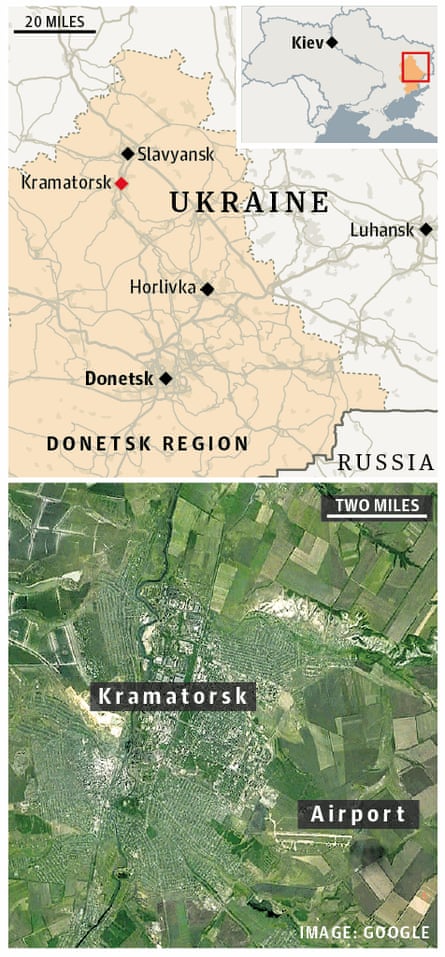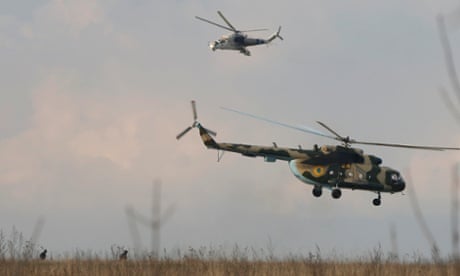Ukrainian government forces launched their first significant military action in the east of the country on Tuesday, clashing with about 30 pro-Russian gunmen at a provincial airfield and heightening fears that the standoff could escalate into a major armed conflict.
Shots were fired in Kramatorsk airport as Ukrainian special forces stormed in to reassert Kiev's control. As troop helicopters hovered above and tempers flared, a Ukrainian general was set upon by a group of local people incensed that two protesters had been injured, knocking off his military-issue fur hat and yelling, "Jail him."
At the same time as Kramatorsk airport was being seized, elite Ukrainian units were also gathering outside the nearby city of Slavyansk in an operation aimed at taking back control from armed pro- Russian groups.
The deployment involved regular army troops alongside special forces from the interior ministry and the security service in at least nine troop carriers and seven buses. Tracked troop carriers could be seen parked in the woods.
It was the first major operation since the Ukrainian government vowed to take "anti-terrorist" action if the rebels did not vacate government buildings in eastern Ukraine. A smaller, abortive operation in Slavyansk on Sunday ended in a shoot-out, in which one Ukrainian soldier died and two were wounded, apparently by pro-Russian forces.
Ukraine's acting president said the recapture of the airport was just the first such action aimed at restoring Kiev's control over the east.
"I just got a call from the Donetsk region: Ukrainian special forces have liberated the airport in the city of Kramatorsk from terrorists," Oleksandr Turchynov told parliament.
"I'm convinced that there will not be any terrorists left soon in Donetsk and other regions and they will find themselves in the dock – this is where they belong."
Russia's president, Vladimir Putin, declared the Ukrainian moves "anti-constitutional acts" and in a phone call to the United Nations secretary general, Ban Ki-moon, demanded that the UN condemn them. But the US voiced strong support for the Ukrainian operation, arguing that the government in Kiev "has to respond" to armed groups.
"We understand the government of Ukraine is working to try to calm the situation in the east and note the measured approach of the Ukrainian security forces thus far," said White House press secretary Jay Carney.
Representatives from Ukraine, Russia, the US and the European Union are due to meet in Geneva on Thursday for the first time since the crisis began in February, but there were clear signs that the situation in eastern Ukraine risked spiralling out of control before the diplomats could meet.
In Kiev, two candidates from a pro-Russian party campaigning for planned May elections were attacked by loyalist crowds.
In Kramatorsk, meanwhile, the commander of the Ukrainian operation to seize back control of the airport, General Vasily Krutov, was jostled and manhandled by furious local people when he addressed a crowd that gathered at the airfield's perimeter.
He had told them that his men had been forced to open fire because they had been confronted by gunmen in military uniform without insignia, but the protesters insisted there had only been local people armed with clubs. The Guardian saw a man in the crowd with a wound on his side that he said was from a bullet graze.
Krutov insisted that the unrest in eastern Ukraine, where protesters are seeking local referendums on greater autonomy from Kiev, were being led by Russian forces. He said more than 300 Russian troops had infiltrated the neighbouring Luhansk region the day before. "We need to destroy this foreign invader," Krutov said. "We have among these spies Russian military, professionals with long experience in all sorts of conflicts."

The mayor of Slavyansk said the pro-Russian local people there were being supported by unmarked troops from Russia and Crimea. Turchynov gave pro-Russians in eastern Ukraine until Monday morning to give up their arms and the buildings they had seized, but instead a pro-Russian mob took over yet another government building in Horlivka that day. A man who appointed a new police chief there later said he was a lieutenant colonel in the Russian army.
Krutov said the government's ultimatum would not be extended. That would be "too humanitarian", he said. He added that civilian casualties were possible but his forces would try to make sure "not one innocent person suffers".
He said: "Unfortunately we face a difficult situation because those realising their plan are hiding behind human shields" – an apparent reference to the many pro-Russian local people who have taken part in taking over buildings. "Some of them are cynically working toward their own ends, but many are under the influence of propaganda," he said.
At the White House, Carney said the Ukrainian authorities had repeatedly sought to negotiate a peaceful resolution with armed groups occupying buildings in eastern cities, and made clear that use of force was not its "preferred action".
But he continued: "That said the Ukrainian government has a responsibility to provide law and order. These provocations in eastern Ukraine are creating a situation in which the government has to respond."
Asked what advice the CIA director, John Brennan, who visited Kiev on Saturday, and other US officials have given security forces in Kiev, Carney replied: "We urged the Ukrainian government to move forward, gradually, responsibly, and with all due caution, as it deals with this situation caused by armed militants.
"Let's be clear: the way to ensure that violence does not occur is for these armed paramilitary groups, and these armed so-called pro-Russian separatists, to vacate the buildings and to lay down their arms."
William Hague, the foreign secretary, said in a speech to the City of London on Tuesday that the EU was completing preparations for "far-reaching economic, trade and financial sanctions whenever necessary" against Moscow.
"In recent days Russia has deliberately pushed Ukraine to the brink, and created a still greater risk of violent confrontation," he said. "We call on Russia to stop these actions and to condemn the lawless acts in eastern Ukraine."
The UN human rights office, meanwhile, said ethnic Russians in eastern Ukraine had falsely claimed to be under assault to justify Russian intervention, warning that such propaganda could affect Ukraine's presidential election next month.
Russia condemned the report, saying it was one-sided and seemed to have been "fabricated" to fit pre-formed conclusions.
The events in Ukraine helped pushed global stock markets down as investors worried that the west might scale up sanctions against Russia. The DAX index in Germany, which has strong trade ties with Russia and imports a third of its gas from the country, fell 1.8%, while Moscow's Micex slumped 2.5%.

Comments (…)
Sign in or create your Guardian account to join the discussion